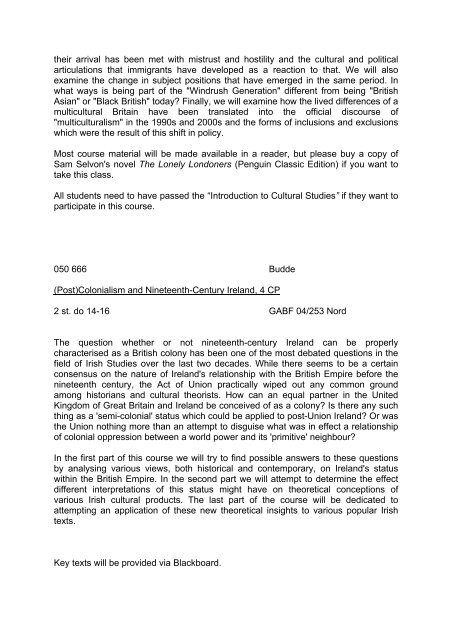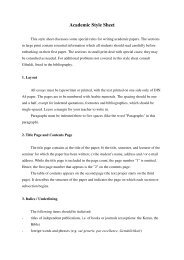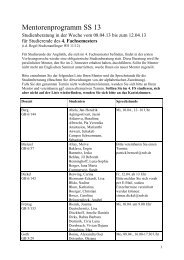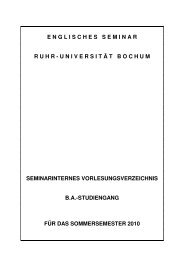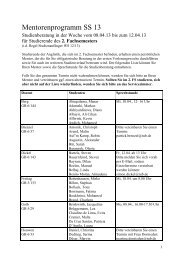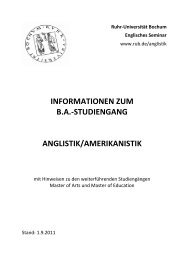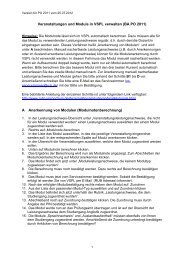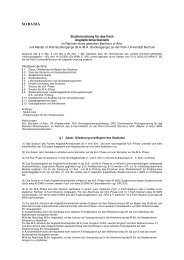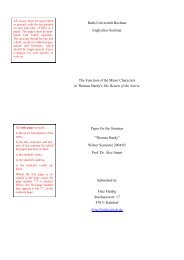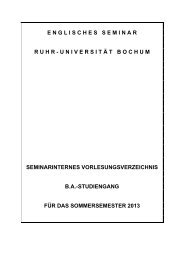Termine im WS 2012/13 - Englisches Seminar - Ruhr-Universität ...
Termine im WS 2012/13 - Englisches Seminar - Ruhr-Universität ...
Termine im WS 2012/13 - Englisches Seminar - Ruhr-Universität ...
Create successful ePaper yourself
Turn your PDF publications into a flip-book with our unique Google optimized e-Paper software.
their arrival has been met with mistrust and hostility and the cultural and political<br />
articulations that <strong>im</strong>migrants have developed as a reaction to that. We will also<br />
examine the change in subject positions that have emerged in the same period. In<br />
what ways is being part of the "Windrush Generation" different from being "British<br />
Asian" or "Black British" today? Finally, we will examine how the lived differences of a<br />
multicultural Britain have been translated into the official discourse of<br />
"multiculturalism" in the 1990s and 2000s and the forms of inclusions and exclusions<br />
which were the result of this shift in policy.<br />
Most course material will be made available in a reader, but please buy a copy of<br />
Sam Selvon's novel The Lonely Londoners (Penguin Classic Edition) if you want to<br />
take this class.<br />
All students need to have passed the “Introduction to Cultural Studies” if they want to<br />
participate in this course.<br />
050 666 Budde<br />
(Post)Colonialism and Nineteenth-Century Ireland, 4 CP<br />
2 st. do 14-16 GABF 04/253 Nord<br />
The question whether or not nineteenth-century Ireland can be properly<br />
characterised as a British colony has been one of the most debated questions in the<br />
field of Irish Studies over the last two decades. While there seems to be a certain<br />
consensus on the nature of Ireland's relationship with the British Empire before the<br />
nineteenth century, the Act of Union practically wiped out any common ground<br />
among historians and cultural theorists. How can an equal partner in the United<br />
Kingdom of Great Britain and Ireland be conceived of as a colony? Is there any such<br />
thing as a 'semi-colonial' status which could be applied to post-Union Ireland? Or was<br />
the Union nothing more than an attempt to disguise what was in effect a relationship<br />
of colonial oppression between a world power and its 'pr<strong>im</strong>itive' neighbour?<br />
In the first part of this course we will try to find possible answers to these questions<br />
by analysing various views, both historical and contemporary, on Ireland's status<br />
within the British Empire. In the second part we will attempt to determine the effect<br />
different interpretations of this status might have on theoretical conceptions of<br />
various Irish cultural products. The last part of the course will be dedicated to<br />
attempting an application of these new theoretical insights to various popular Irish<br />
texts.<br />
Key texts will be provided via Blackboard.


